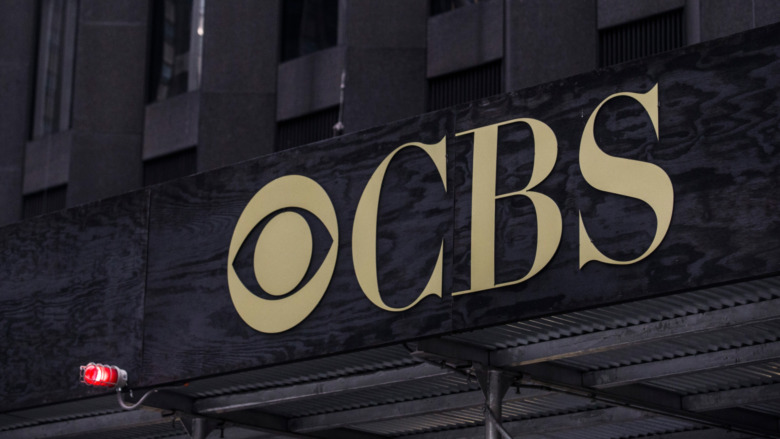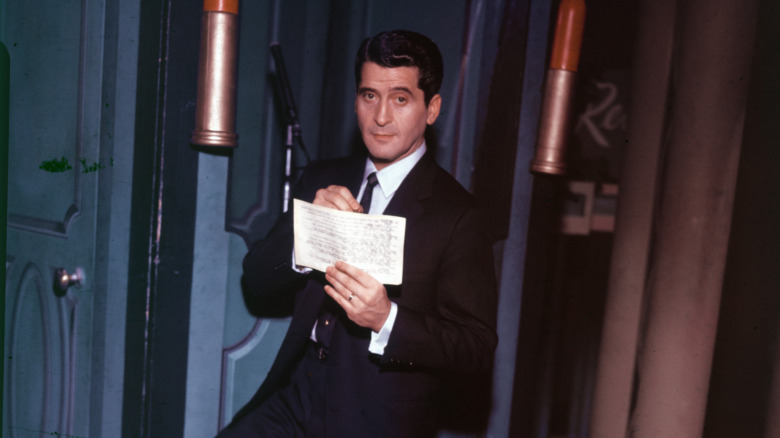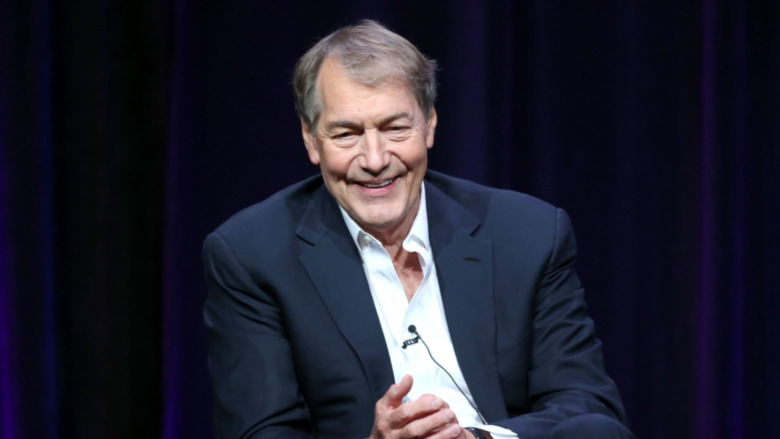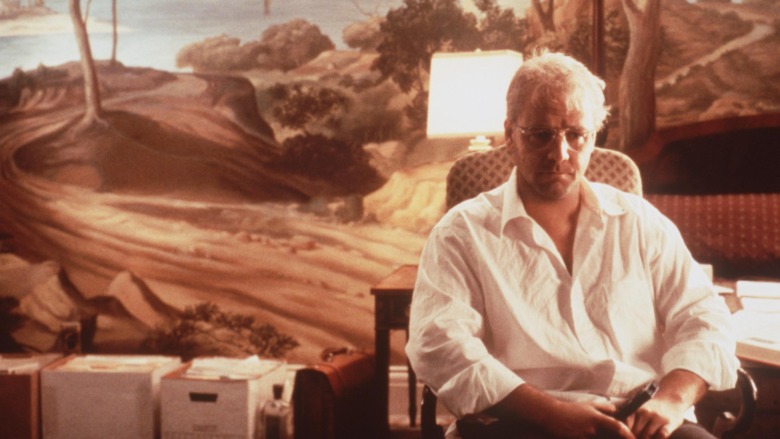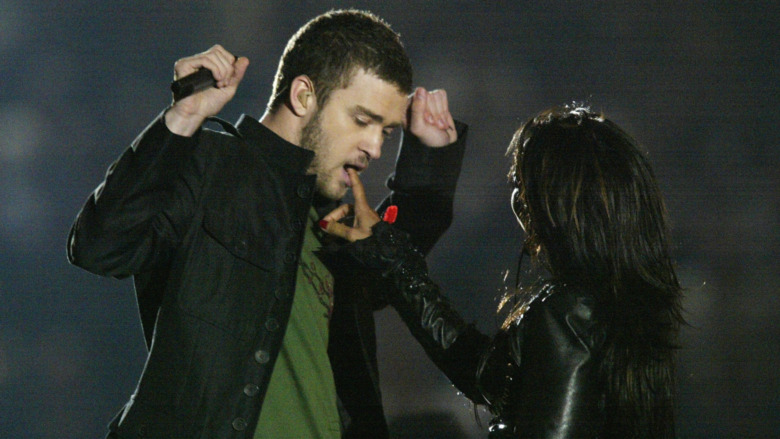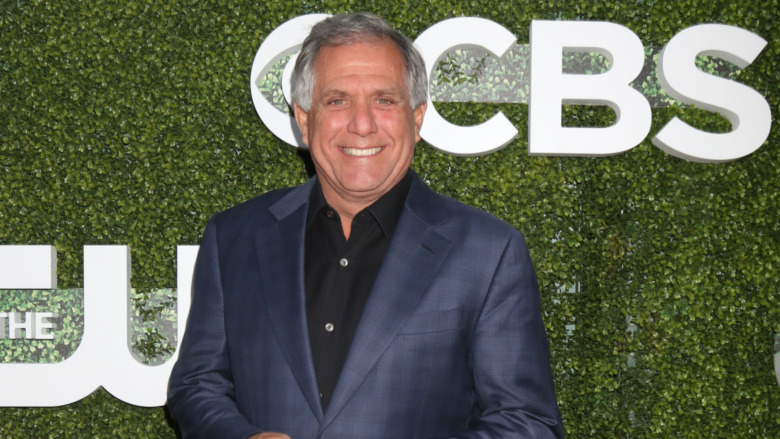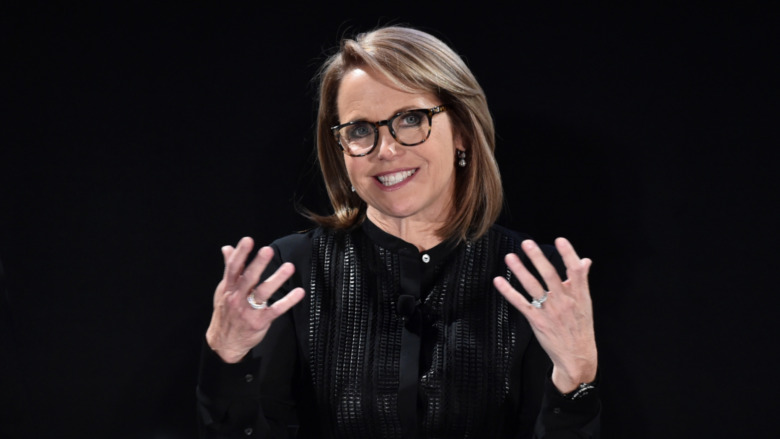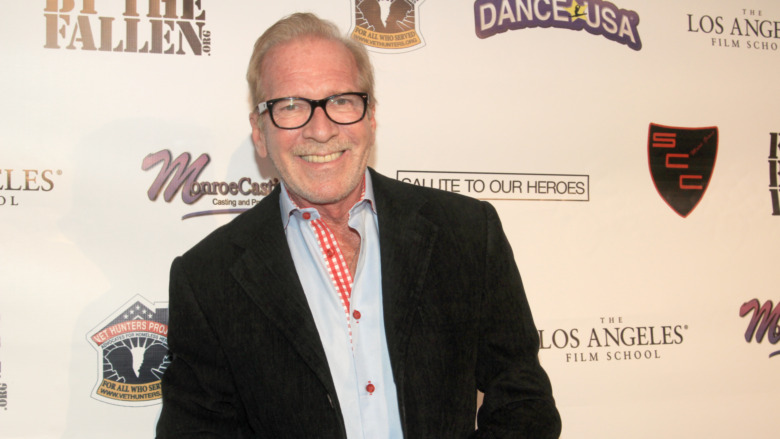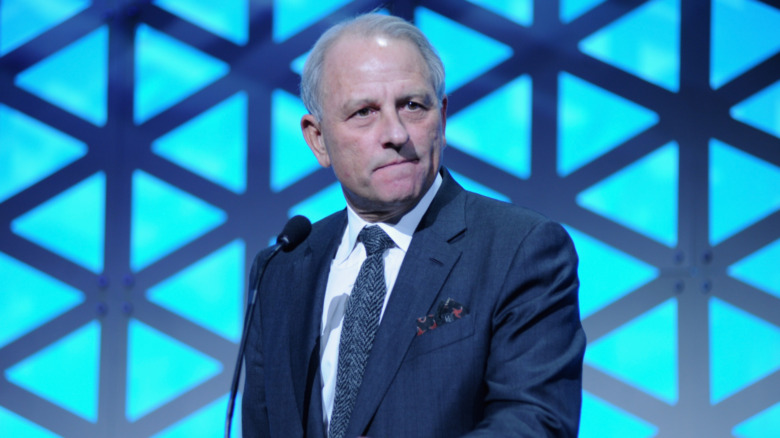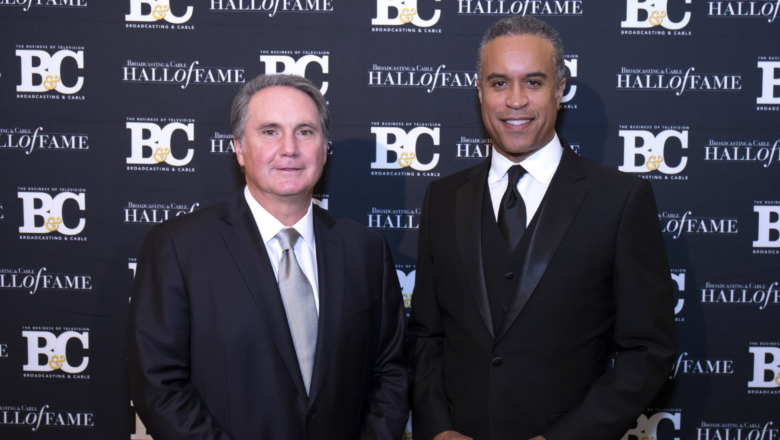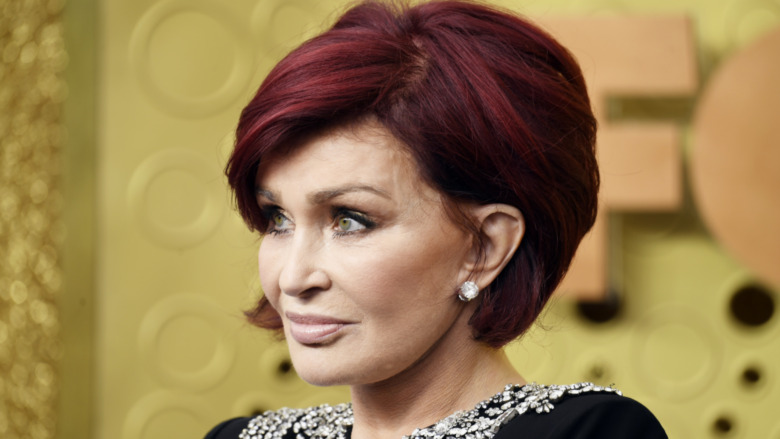The Biggest Scandals To Hit CBS
CBS began as a radio network called the United Independent Broadcasters Inc. In 1927, the network was bought by the Columbia Phonograph Company and re-branded the Columbia Phonographic Broadcasting System; after Columbia sold the network in 1928 it was once again rebranded as the Columbia Broadcasting System—or CBS, as it's currently known. In the days before cable, CBS was one of the "big three" networks in the United States alongside ABC and NBC.
Over the course of nearly a century of operation, it would be impossible for a network like CBS to avoid scandal—organizations and companies are made up of people, after all, and people make mistakes and lose control all the time. The key difference when it comes to the people involved with a television network is that when they make mistakes or lose control, there's a very good chance it's on the air in front of millions of people. Even when the scandal happens away from the cameras, it always seems to leak out eventually.
CBS is no exception—it's had plenty of bad moments over the course of its history. Here are some of the biggest scandals to hit CBS since its inception more than 90 years ago.
The $64,000 Dollar Question
In the modern day, game shows are a staple of television, and we all take as a matter of course that people routinely win large sums of money by appearing on them. But in the 1950s, quiz shows were a phenomenon. The nascent television networks launched scads of them, and they captured the public's imagination. Which made the ensuing scandal kind of incredible, because it affected more than one show—and more than one network.
CBS launched The $64,000 Question in 1955. The format was pretty simple: Contestants answered questions about a variety of subjects. Every time they answered correctly, the amount of money they could win doubled, and the questions became (theoretically) more difficult. But as American Heritage notes, the show shared something in common with just about every other quiz show on TV at the time—it was rigged.
The $64,000 Question was brought down by Rev. C. E. (Stoney) Jackson, Jr. Broke and in debt, Jackson became a contestant hoping to gain some notoriety and pay off his debts. Instead, as the Los Angeles Times reports, he became a whistleblower, revealing that not only had he been rehearsed and subtly given answers, but the producers manipulated the contestants to ensure they controlled who advanced and who lost.
By 1959, all of the major quiz shows had been canceled as a result of this widespread cheating, and new laws were put in place to make such manipulation illegal.
Charlie Rose's 30-year reign of terror
The #MeToo movement is pretty recent, but that's a bit deceptive—the behavior being exposed often goes back decades. Even worse, the movement is also revealing that companies like CBS have been actively ignoring or even covering up the misdeeds of their powerful employees and executives. A demoralizing example is Charlie Rose, who engaged in some really awful behavior for decades without any serious consequences.
Rose was already an established journalist when CBS News hired him in 1984 to anchor CBS Nightwatch, a late-night news program. As The Washington Post notes, the first serious complaints about Rose's behavior towards women were raised as early as 1986—and repeated many times over the next 30 years of his association with the network. When Rose's victims finally made their accusations public in 2018, they were shocking: Rose would routinely make lewd remarks on phone calls, undress and walk around naked in the office, and grope female staffers. According to The Guardian, Rose's nickname among female staff was "The Crusty Claw" due to his frequent and infamous groping.
And yet nothing was done until public sentiment turned against Rose and his employers. Rose was replaced as co-anchor on CBS This Morning and was also fired by PBS, where he'd worked since 1975.
The scandal that inspired 'The Insider'
In a notorious incident that inspired the Russel Crowe-Al Pacino film The Insider (pictured), CBS caved to legal pressure from tobacco industry giant Brown & Williamson, sparking a firestorm of scandal and journalistic outrage.
As The New York Times explains, CBS' flagship news magazine program, 60 Minutes, had conducted intensive interviews in 1996 with Jeffrey Wigand, former head of research and development (R&D) at Brown & Williamson Tobacco Corp. Wigand alleged that the company had intentionally altered the composition of its tobacco blends to increase the addictive properties of nicotine. The interview was set to be explosive at a time when the tobacco industry was fighting increasing pressure from critics of its marketing and the danger posed by its products.
As Vanity Fair reports, Brown & Williamson responded by unleashing a torrent of litigation and harassment against Wigand—and CBS. Brown and Williamson argued that Wigand had a contract and a non-disclosure agreement—and threatened to sue CBS if they broadcast confidential company information. CBS was advised by their lawyers that they could be on the hook for huge amounts of money—so they caved. CBS was perceived as allowing a corporation to muzzle the free press, and their news division, one of the most respected in the industry at the time, suffered a huge blow to its prestige.
The forged George W. Bush documents
The pressure on news divisions to break stories and be out in front is enormous. Once a story is out in the world people have less of a reason to tune in specifically to your program, after all. In 2004, CBS News let that pressure get to it, and it cost five highly-placed folks their jobs—including Evening News anchor Dan Rather.
As The Baltimore Sun reports, Rather presented a story on 60 Minutes that claimed George W. Bush, running for reelection as president of the United States at the time, had received preferential treatment during his service in the Texas Army National Guard. These claims were backed up by several memos supposedly written in 1973 and acquired from military sources. Unfortunately for Rather and CBS, the memos were forgeries—and kind of obvious ones. For one thing, the memos used a font that didn't exist in 1973—because they were simply typed up in Microsoft Word and printed out, then made to look old.
CBS fired four high-level producers as a result, and forced Rather to retire long before he'd planned. As The Hollywood Reporter notes, Rather initially apologized for his gaffe, but then filed a lawsuit against CBS claiming he'd been scapegoated. The lawsuit went nowhere, but Rather still vehemently defends his reporting. He unequivocally says that the story was factually true even if the evidence should have been vetted more firmly.
The Justin Timberlake/Janet Jackson Super Bowl halftime show
In 2004, Janet Jackson was hired to headline the Super Bowl halftime show, and she brought along P. Diddy, Kid Rock, and Justin Timberlake as special guests—though no one remembers Diddy or Kid Rock, in part because they're Diddy and Kid Rock and in part because of what happened at the end of Timberlake and Jackson's duet to Timberlake's hit "Rock Your Body."
As Vox explains, just as Timberlake sang the lyric "gotta have you naked by the end of this song," he reached over and ripped off part of Jackson's costume, revealing her naked breast. Now, a split-second of a nipple on live television might not seem like a big deal today, but back in the simpler times of 2004 it outraged people. The NFL fielded hundreds of thousands of complaints about the incident, and The Hill reports that the Federal Communications Commission (FCC) levied a record-setting fine against CBS in the amount of $550,000 for indecency.
The network claimed it had no foreknowledge of the stunt, fought the fine tooth and nail, and eventually won. A game of pass-the-buck ensued—the NFL blamed MTV, which produced the show. MTV and its parent company, Viacom (which also owned CBS), blamed Jackson, claiming she'd planned the whole thing. Jackson and Timberlake were blacklisted from any Viacom productions (including that year's Grammy Awards) but Timberlake made a tearful apology to CBS Chairman Les Moonves and was forgiven—Jackson, not so much.
The Les Moonves sexual harassment scandal
Les Moonves is a television legend. Prior to running CBS as chairman and CEO, he brought shows like Friends and ER to the small screen, and enjoyed a string of successes that would make any other executive jealous. He was also apparently kind of a monster. As GQ reports, after the Justin Timberlake/Janet Jackson debacle at the 2004 Super Bowl halftime show, Moonves became "obsessed" with destroying Janet Jackson's career, banning her from television appearances and ordering companies within Viacom's umbrella to stop playing her music.
Worse, as reported by Forbes, this was clearly a pattern of behavior towards women, as Moonves was forced to resign from his powerful position in 2018 after he was accused of sexual harassment and sexual assault. No fewer than 12 women accused Moonves of forcing himself on them and then trying to destroy their careers when they resisted his advances.
It was a costly comeuppance for Moonves. Contractually, he would have received $280 million in an exit package—but due to the circumstances of his departure, he got nothing. Don't cry for Les Moonves, however. He's still worth close to a billion dollars.
That time Katie Couric plagiarized a fellow journalist
Katie Couric has enjoyed one of the most successful journalism careers in television history. She's worked for all three major networks in her time, and is still a respected and popular host and interviewer. But her career hasn't been immune to missteps—including one that embroiled CBS in yet another scandal.
To be fair, this one wasn't entirely Couric's fault. While serving as anchor for CBS Evening News, Couric maintained a vlog on the show's website called "Katie Couric's Notebook." As reported by the Los Angeles Times, Couric's April 4, 2007 entry was a nice editorial about the value of education, reading, and libraries. Couric shared what sounded like a personal story about going to her local library as a kid. The problem, as Digital Journal notes, was the whole script was pretty blatantly plagiarized from a column by Jeffrey Zaslow that appeared in The Wall Street Journal. Entire sentences were lifted word-for-word, and much of the rest of the material was clearly just lightly revised to try to obscure the theft.
Couric insisted she'd had no idea, that the producer that worked on the vlog entry with her was to blame. This cleared Couric of the embarrassing charge of plagiarism but revealed the embarrassing fact that she'd cheerfully told a completely made-up story about her own life, and had done zero checking about the source of the material. The producer was fired. Couric just looked foolish.
The Pat O'Brien debacle
One of the most amazing things revealed by the #MeToo movement and the current atmosphere of intolerance towards habitual harassers and abusers is how long men are allowed to behave atrociously, and how much they can get away with once in a position of influence. Case in point: Pat O'Brien.
O'Brien worked for CBS Sports for 16 years before becoming anchor of Access Hollywood and The Insider. He was also a severe alcoholic—as Sportscasting reports, O'Brien once admitted to drinking 14 bottles of wine by himself in one day, winding up passed out on a beach in Nantucket. When he left a series of gross voicemails on an anonymous woman's phone and they were leaked in 2005, O'Brien apologized, blamed his disease, and entered rehab. The move worked, and O'Brien returned to his job—CBS even signed him to a fresh deal.
O'Brien tried the same trick in 2008 when he went checked into rehab again. But the Huffington Post informs us he lost his job that time after sending an angry email insulting his co-host on The Insider, Lara Spencer, and other staffers. Despite following the same playbook as he had three years before, O'Brien was finally pushed out the door.
The Jaff Fager firing
It might be slowly dawning on powerful men in the media industry that they really can't just threaten and abuse people the way they once could. It certainly dawned on famed 60 Minutes producer (and former chairman of CBS News) Jeff Fager in 2018 when he was summarily fired for generally being a trash person.
As CNN reports, Fager was named along with Les Moonves in Ronan Farrow's famous reporting about a culture of sexual harassment and misogyny at CBS. Moonves was forced to resign, but Fager was still hanging on at the network three days later. Fager strongly denied the accusations, his career was in serious jeopardy—but he was still officially employed. Then, as Variety notes, he made a huge mistake when he sent a CBS News reporter, Jericka Duncan, a blistering, angry email threatening her career over her coverage of the scandal. The message read, in part, "Be careful. There are people who lost their jobs trying to harm me" which sure sounded like a threat to anyone who read the email.
That was the last straw for CBS, which was drowning in a flood of sexual harassment scandals. They fired Fager after 36 years of employment.
The Michael Weatherly scandal
The most surprising thing about the CBS legal drama Bull is the fact that it was created by none other than Dr. Phil, who based it on his own early career as a jury consultant working with law firms. The second-most surprising thing about Bull is that it wasn't canceled after Eliza Dushku accused star Michael Weatherly of being a total creep.
As The New York Times reports, the actress signed on to the series in 2017 with a three-episode commitment with the intention of becoming a full-time cast member in season two. Things started off well, then went shockingly sour. Dushku was fired from the show, and published a lengthy letter in The Boston Globe accusing Weatherly of making several sexually-charged and inappropriate remarks towards her. Dushku also asserted that when she complained about this behavior, she was summarily fired.
Weatherly more or less admitted he'd made the comments, though he claimed he had no idea she'd been offended. CBS, embroiled in yet another sexual harassment scandal, started taking on damage—EW reports that Steven Spielberg's Amblin Entertainment dropped the show in the wake of the scandal. In order to make it all go away, CBS paid Dushku a settlement of $9.5 million—equal to what she would have made if she'd stayed on the show for six seasons as originally planned.
The Peter Dunn and David Friend scandal
CBS just isn't having a good decade when it comes to its internal culture of sexism, racism, and general abuse of employees. After firing its chairman, firing several high-level producers, and settling with actress Eliza Dushku for nearly $10 million over sexual harassment accusations, the network still had one more major scandal to pull through.
As The Los Angeles Times reports, CBS sought to clean up its image after all of these scandals by hiring two independent firms to conduct an internal investigation and determine whether the company had a "toxic atmosphere." Unfortunately for CBS, the answer was an emphatic "yes."
According to The New York Times, as a direct result of the investigation's findings, CBS executives Peter Dunn (president of CBS Television) and David Friend (senior vice president of News) were initially placed on administrative leave. The two executives were accused by several employees of bullying behavior towards women, using inappropriate language about women and minorities, and refusing to hire Black journalists for CBS stations. A few months later, Variety reported that both men had been forced to leave CBS—though Dunn, at least, was still going to be paid because he technically hadn't been terminated for cause.
The Sharon Osbourne debacle
One thing every celebrity should know by now is that if you're going to wade into the conversation surrounding racism, sexism, and harassment you'd better choose your words very carefully. When Sharon Osbourne chose to speak, she should have also been more careful about choosing her friends.
As People reports, in March 2021 Osbourne came out swinging on CBS' The Talk in defense of her pal Piers Morgan after he accused Meghan Markle of lying about her experiences of racism with the British Royal Family. Osbourne got into a fight live on the air with co-host Sheryl Underwood, demanding to know why she would be considered racist simply for supporting her friend. If it had ended there, it would have been awkward—but not a scandal. Unfortunately for Osbourne, her fiery denial of racism led to an onslaught of accusations from various sources that she'd frequently used racist, homophobic, and bullying language in her private and professional dealings. Several unprintable comments were levied at former colleagues Julie Chen and Sarah Gilbert.
As reported by EW, despite Osbourne's fierce denials she was soon out of a job. CBS put The Talk on hiatus, then brought it back with a week-long focus on discussing race and healing in an effort to clean up the show's brand and reset after Osbourne's contentious departure.
